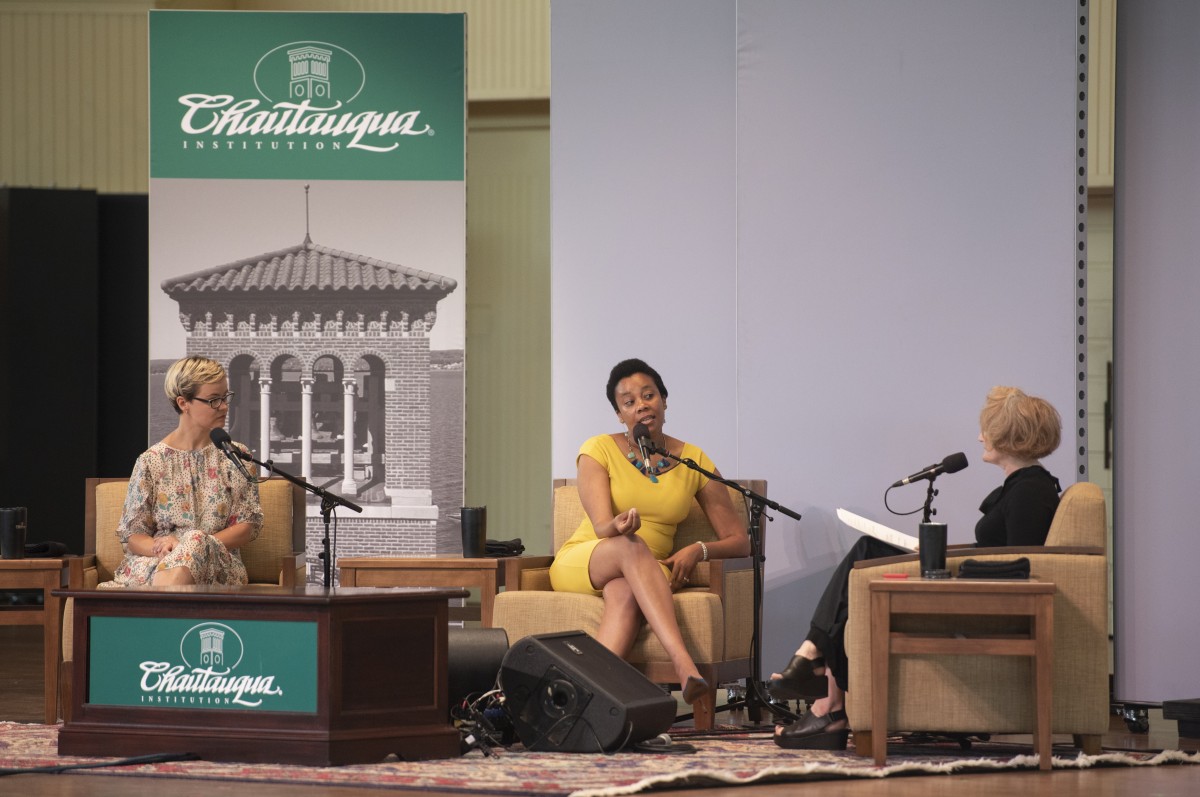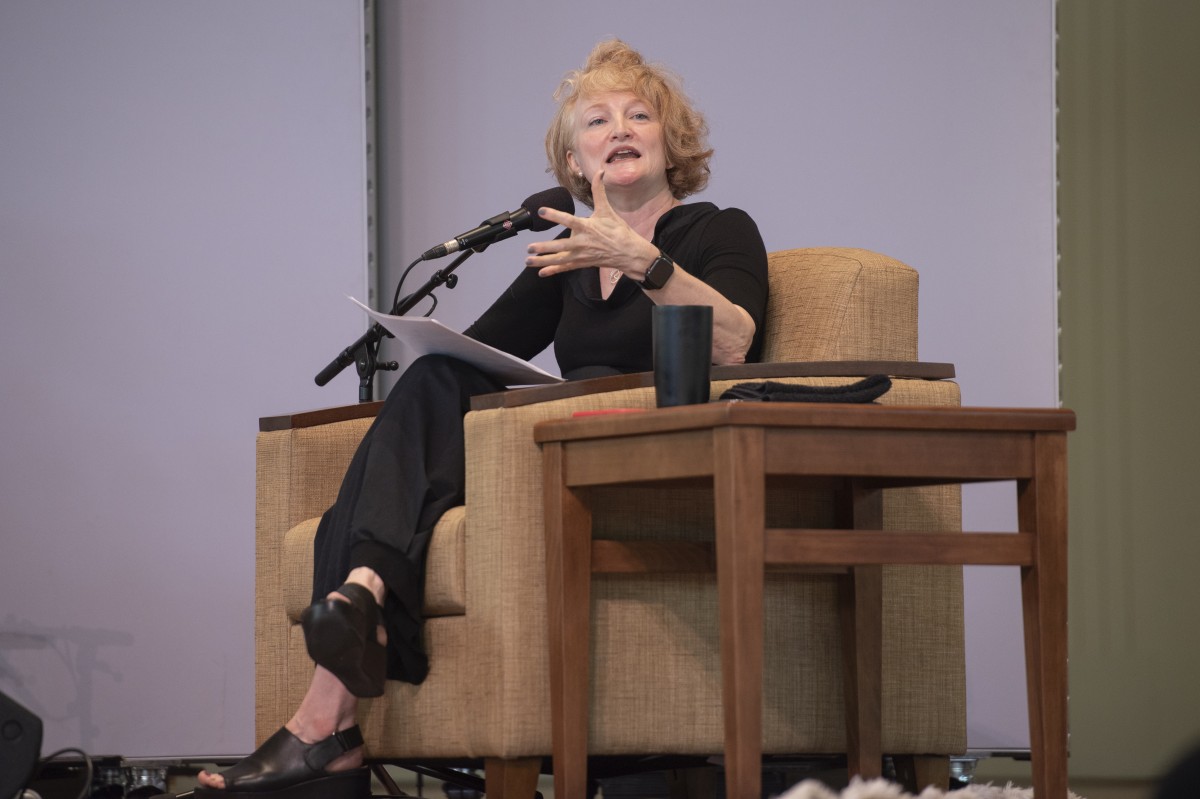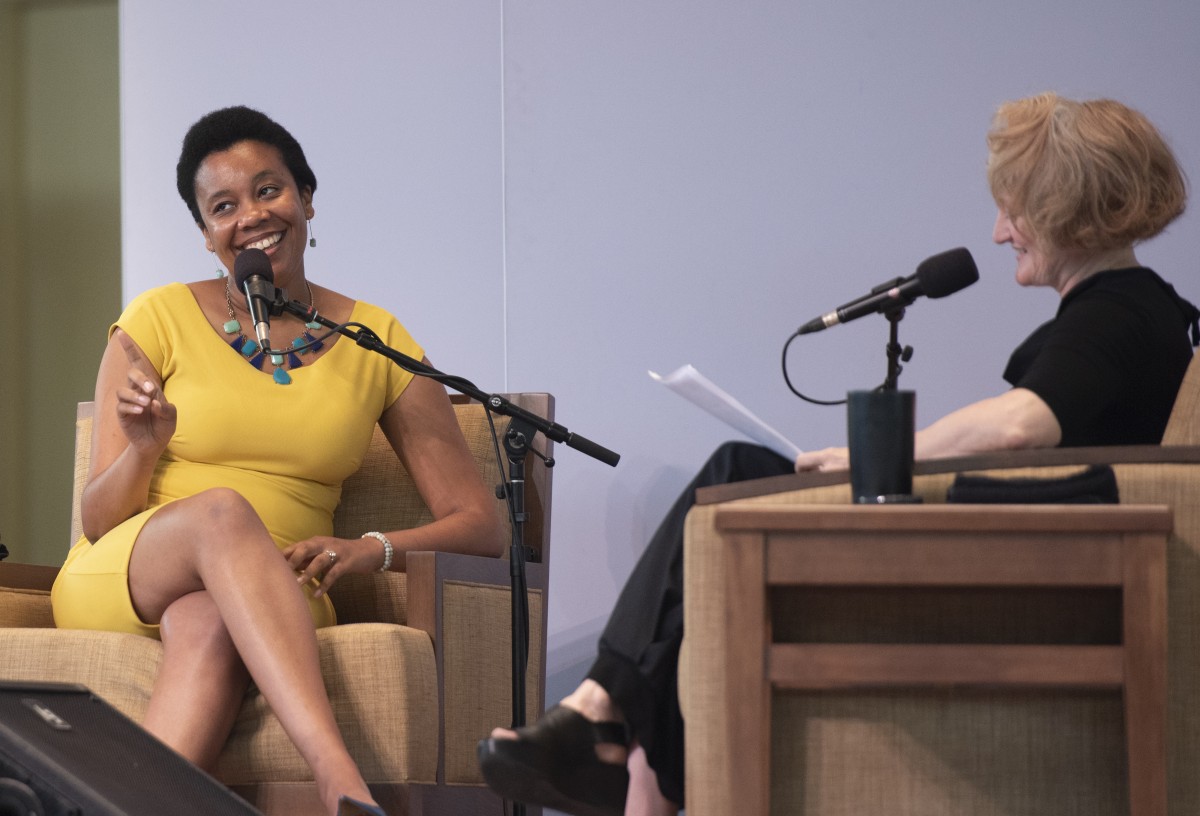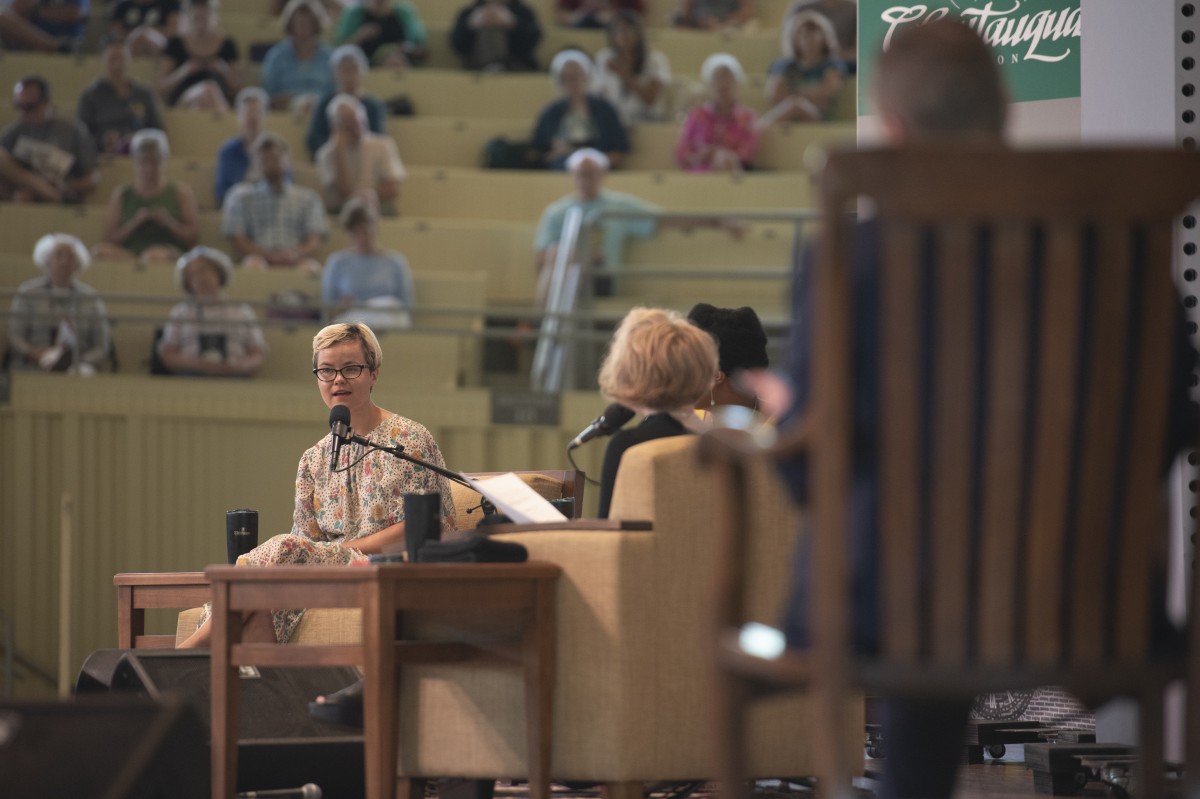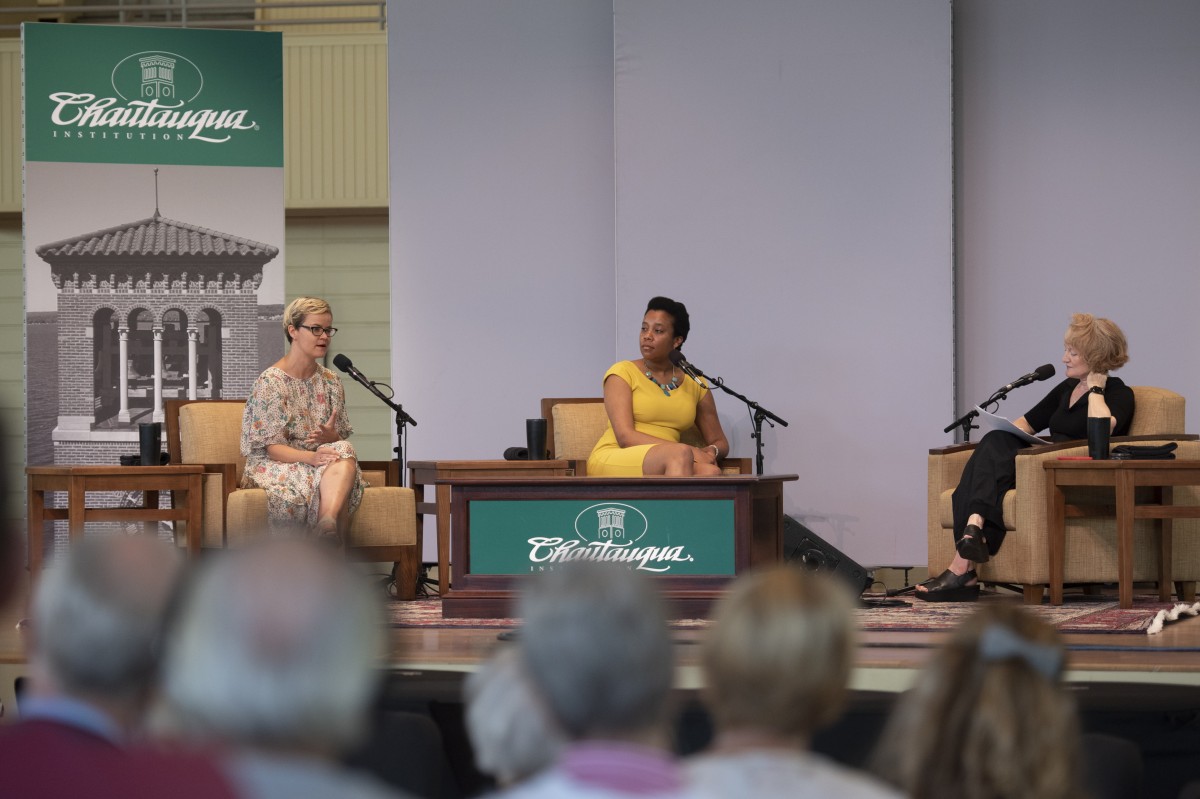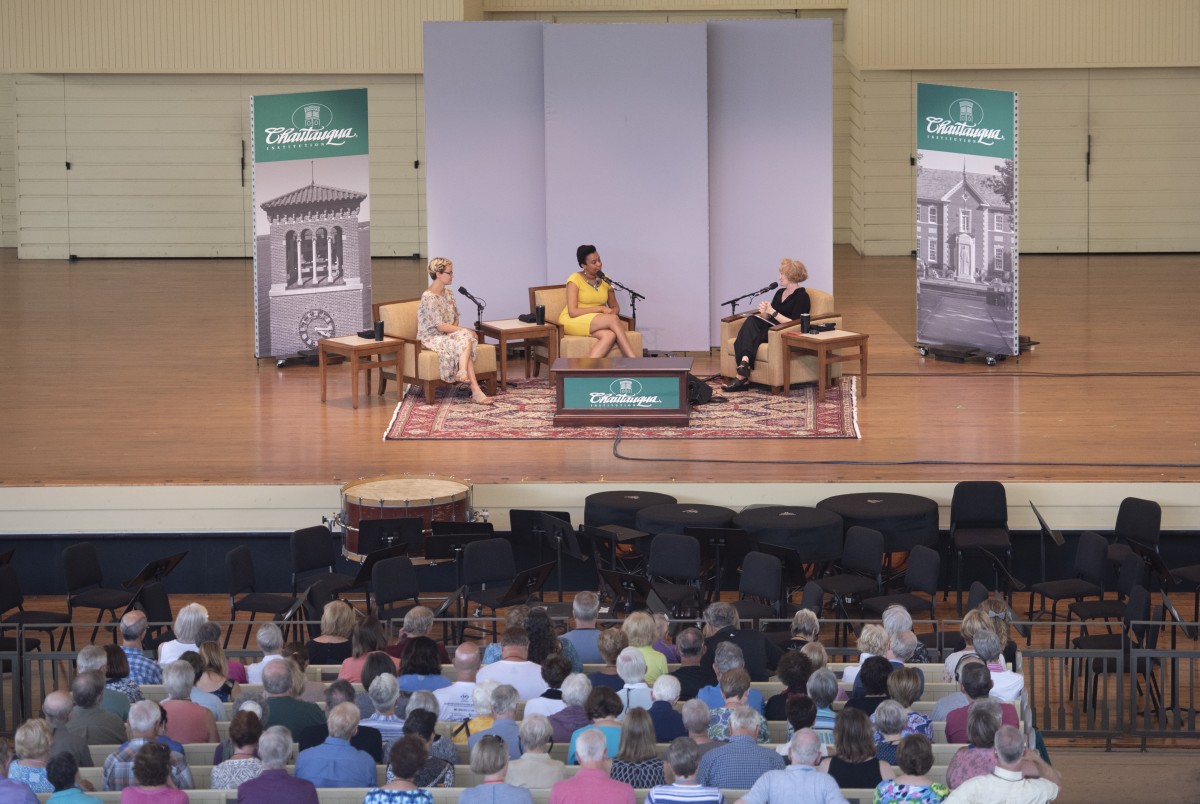If Krista Tippett was to free associate with “grace,” the first word that comes to mind is “amazing” — amazing grace.
Using that “amazing grace,” Tippett set out to pursue the answers to three elemental human questions: “What does it mean to be human? How do we want to live? Who will we be to each other?”
Tippett, journalist, author and host of “On Being with Krista Tippett,” explored the answers to those questions with the help of the Rev. Jennifer Bailey, executive director of Faith Matters Network and co-founder of The People’s Supper, and Lennon Flowers, co-founder of The People’s Supper and The Dinner Party, at 10:45 a.m. Monday in the Amphitheater, opening Week Seven’s morning lecture series, “Grace: A Celebration of Extraordinary Gifts — A Week in Partnership with Krista Tippett and ‘On Being.’ ”
“It is a world of great, open questions and excruciating reckonings; a world which calls us to rise to the best of our humanity, in this century, if what we want is to flourish and not merely survive,” Tippett said.
As a pastor, Bailey said it should be “apparent” that her background in religion was born in the church, but more broadly, it was connected to her hometown, Quincy, Illinois. Growing up, Bailey said Quincy’s population was 90% white and 10% “all others.” As she faced discrimination in school and on the streets, she turned to her “safe space,” Bethel African Methodist Episcopal Church.
“That affirmation that I was, indeed, beloved in the eyes of God, that my brownness was something to be honored, that God delighted in me, that really happened in those kitchen spaces in the church,” Bailey said.
Over pots of greens and black-eyed peas and games of spades, Bailey learned to “raise her voice” and speak her truth at her grandmother’s kitchen table.
“In that truth-telling was sacred space, and it wasn’t the same sacred space I experienced in the church kitchen; it was a sacred space that allowed for a type of dissemination of knowledge,” she said.
The stories of survival she heard from both of her grandmothers painted a picture of trauma and what it meant to flee the Jim Crow South in search of a better life.
“I think those two experiences with my grandmothers, and in the church kitchen, really informed both my theology, and what it means to be a black woman in today’s United States,” Bailey said.
Bailey said she learned to raise her voice and speak at her grandmothers table.
— The Chautauquan Daily (@chqdaily) August 5, 2019
Flowers grew up “between worlds” in Raleigh, North Carolina. The first world was middle class, a world her mother built after living in endemic poverty. The other world was much more political, and existed in the lives of her extended family in “tobacco country.”
“I grew up surrounded and vacillating between spaces and people who lived in very different conditions, and I think one of the things I took away from that, that my mom was really adamant that I do, was to never, ever confuse a person’s capacity with their circumstances and to be able to seek out and to look for capacity,” Flowers said.
Flowers’ mother didn’t romanticize poverty, and according to Flowers, the people who tend to are the ones who have never known it. However, she also didn’t romanticize wealth and found currency in other aspects of life.
“For her, what was supremely important as a currency that mattered, was the use of your voice,” Flowers said. “She grew up in circumstances that can make you feel very, very small, and so she really made it clear to my brother and me that we could be big, and that what mattered in this life wasn’t anything attached to the money that we earned, but doing something that mattered and mattered to us.”
During Flowers’ senior year of high school, her mother was diagnosed with cancer, and passed away her senior year of college. In the four years she was sick, Flowers said she became “really good” at keeping a clear line between being a caregiver and being a student.
“I was living a divided life, but it was a necessary division,” she said. “We live in a world that doesn’t necessarily invite us to share the messiest parts of ourselves. I learned very early on to stay very busy and to fill every minute of every day and to find ways around not exposing what felt like the complicated parts of my world.”
Nearly four years after her mother passed, Flowers moved to Los Angeles, knowing no one apart from the boyfriend she moved there for, and would soon break up with.
“As with anyone who is moving to a new place, I was longing for friends and for community,” she said. “Finally, for the first time in my life, I was in a place where I wanted to talk about my mom and could do so without immediately falling apart; the problem was, there wasn’t anybody to talk to.”
But then Flowers met Carla Fernandez, co-founder of The Dinner Party. Flowers and Fernandez had a lot in common; Fernandez also lost a parent, they were starting at the same job within two weeks of each other and they both moved to the city for musician boyfriends who “didn’t last long.”
After four months of friendship, Fernandez opened up about her father. Since it wasn’t an office conversation, she invited Flowers over for what, unbeknownst to them, was their first official “dinner party.”
“I showed up as a guest to my first dinner, long before The Dinner Party was capitalized, or even conceived as an organization — it was a longing for friends,” Flowers said.
Flowers believes her generation’s trouble with grief partially stems from social media, a platform she said “invites performance.”
“We are projecting the best possible version and image of our lives and hiding all of the messy parts,” she said. “There’s truth to that, but I think that there is another side to that story as well. But to assume that we are worse at talking about loss now, presupposes that we were good at it, ever, and I don’t think that’s the case.”
Tippett said that multigenerational trouble with grief is “stunning” because every person “walks around with some kind of loss.” Flowers said this is due to the myth that grief comes with an expiration date.
“I was a nerdy kid, and I wanted to get my grief grade-‘A’ acceptance and be done,” Flowers said. “So, that was shocking to me when, three and a half years later, there were still so many parts of my life that were colored by who my mother was as a living person, by her absence and the way it shaped my relationships with the living and what I wanted from my time on Earth, which I learned early on was limited.”
When the process is done right, Flowers said grief brings “post-traumatic growth.”
“We have to have a space where we can sit with, acknowledge, and deal with grief.” – Flowers #CHQ2019
— The Chautauquan Daily (@chqdaily) August 5, 2019
“If you sit with someone who is really suffering and you talk about the gift of suffering, then you are insufferable,” she said. “Part of what we need to learn to do is to sit with the unfixable and just hold each other. Sometimes, what we could offer wasn’t advice or expertise — you know none of us have letters behind our names — but we were experts in our own story and we could witness and be witnessed by one another.”
Bailey also lost her mother to cancer, but said she feels grief in other aspects of her life as well. To her, the 2016 presidential election was a loss in its own way.
The election brought back family stories she was exposed to as a child. Her mother, who desegregated her high school, taught her that “safety is an illusion only afforded to a few.” Her great-grandfather had to escape the KKK after he tried to register black people to vote. Her grandmother experienced a lynching in her town at 11 years old.
“I think it was out of space of recognition, but the uncovering moment for me was just exposing what generations of my family had always known was at the heart of democracy, which was this great sin of white supremacy and that we were a product of those who survived,” Bailey said.
As Bailey reflects on the election, she always thinks about her future children, and hopes for their sake, people will begin to imagine what the “promise of America could be.”
“I think in America, we are in process,” Bailey said. “We are at a really important and deep moment of uncovery that is ugly, and there is a choice before us; the question is whether or not we will continue to be in process toward the promise of what America could be, or default into the worst of our instincts.”
In healing from loss and other life obstacles, Flowers said collective care is more important than self-care.
“I think one of the things we forget about self-care is that it doesn’t work in isolation — we live in a time of endemic loneliness,” Flowers said. “Part of what tethers us to life on Earth are the people we care about and the people who care for us.”
And the data is there to back up her claim of “endemic loneliness”: Suicide rates have gone up 30% in the last 20 years, and more than 50% of people who die by suicide had no known mental health problems, according to Flowers.
“What that actually tells us, and it’s true for anybody who lives with suffering in any form, which is everybody, is that what we carry, we carry alone,” she said.
.@lennonflowers #CHQ2019 pic.twitter.com/MfeRd2OZiw
— The Chautauquan Daily (@chqdaily) August 5, 2019
Millennials are among the loneliest demographics, but social media isn’t the driving force; it is lack of face-to-face communication and connection.
“Relationships, let’s make no mistake, can’t be compelled,” Flowers said. “So what are the conditions that invite that? Part of that answer is time.”
The mantra shared at The People’s Supper is centered on time: “Relationships move at the speed of trust, social change moves at the speed of relationships.”
“There has been no movement for justice or equity in this country that didn’t start with relationship,” Bailey said. “It doesn’t happen singularly.”
Bailey learned that lesson about time when she entered ministry at 24, feeling pigeonholed in being her church’s new “hot, young thing,” with a career that felt “fast and long.”
“I felt like I was growing really fast and long, but not deep and wide,” Bailey said. “As I think about this work of social change that we’re undertaking, the transformative practice of trying to build the America that we want to see, it’s a generational project. Thank God I believe in a faith tradition where my time currency is eternity.”
Flowers said the need for America’s transformation was apparent to her through her #100Days100Dinners project, where Bailey, Flowers and their co-founder Emily May organized 100 dinners in the first 100 days of Donald Trump’s presidency to facilitate conversation and healing.
According to Flowers, some attendees had “problematic motivations,” as they looked to match the optics of their lives with the values they professed to hold.
“They wanted to sit down with a token person of color; a token immigrant, preferably undocumented; they wanted to have a moment to show a pity face and show that they were every bit as compassionate as they thought they were,” Flowers said. “They wanted to sit down with a Trump supporter and prove they were morally and intellectually superior, they wanted to take a selfie at the end of the night, and then they wanted to be done — that is not the way that social change works.”
“To me, white supremacy is a theology.” – Bailey #CHQ2019
— The Chautauquan Daily (@chqdaily) August 5, 2019
Whether it be at The Dinner Party or The People’s Supper, Tippett said hospitality is what will drive change, as it invites people across differences to “bring their best selves into the room.”
“While people share their stories and bear their scars, the group has a responsibility to elevate and hear their stories,” Tippett said. “Brave space works to create a space that is supporting, healing and nurturing to all involved.”


